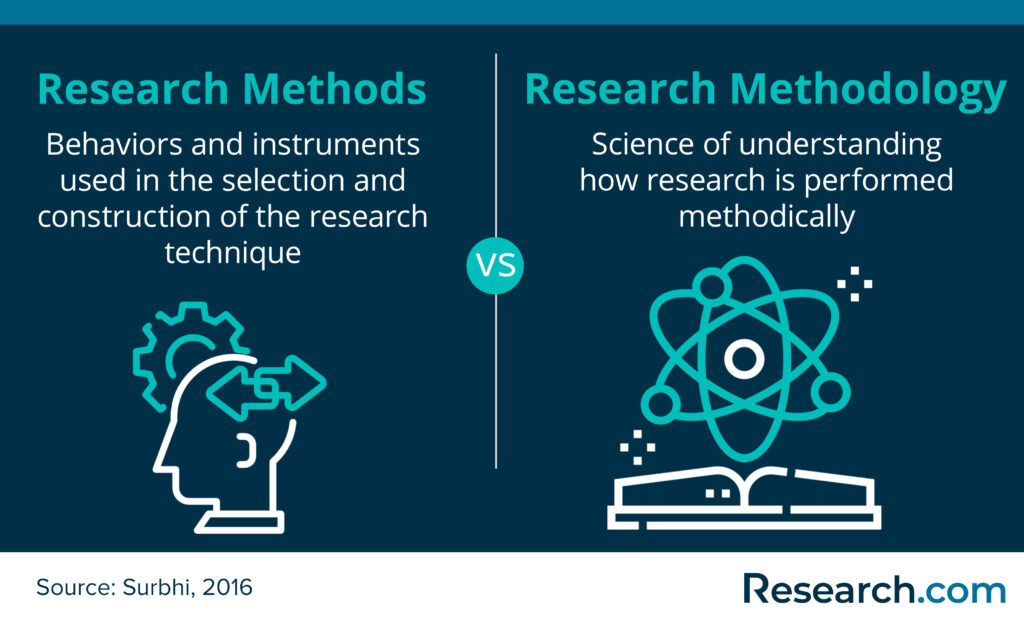Why research methology is important?
Research methodology is crucial because it provides a framework for the entire research process and helps ensure that the research is valid, reliable, and trustworthy.
What Is a Research Methodology?
Research methodology is the systematic process of collecting, analyzing, and interpreting data or information to answer research questions or test hypotheses.
Methodology vs. Methods
The confusion between “methodology” and “methods” in research is a common occurrence, especially with the terms sometimes being used interchangeably. Methods and methodology in the context of research refer to two related but different things: method is the technique used in gathering evidence; methodology, on the other hand, “is the underlying theory and analysis of how a research does or should proceed” (Kirsch & Sullivan, 1992, p. 2). Similarly, Birks and Mills (2011, p. 4) define methodology as “a set of principles and ideas that inform the design of a research study.” Meanwhile, methods are “practical procedures used to generate and analyze data (Birks and Mills, 2011, p. 4).
To summarize these definitions, methods cover the technical procedures or steps taken to do the research, and methodology provides the underlying reasons why certain methods are used in the process.

Ways to Conduct Researching on your own:
Choosing a topic: This can be tough at first. Luckily, using the resources above, you’ve probably already defined a clear area of passion into which you can start digging. Next, you’ll want to think about investigating a specific topic that hasn’t been fully explored yet. This is your opportunity to become the expert on that question!
- Finding a mentor
- Reach out to your school: Start by contacting your high school’s science or research department. They may have information about local research programs, university partnerships, or professionals in your community who could potentially serve as mentors.
- Utilize online platforms: Look for online platforms and websites that connect students with mentors or research programs. Websites such as the National High School Journal of Science, ResearchGate, or your country’s science and research organizations may offer resources or directories of mentors willing to guide high school students.
- Attend scientific conferences or events: Check if there are any scientific conferences or events happening in your area. These events often provide opportunities to meet and network with researchers, professors, and industry professionals who may be willing to mentor high school students interested in research.
- Contact local universities or research institutions: Reach out to nearby universities or research institutions that align with your research interests. Many professors or researchers are willing to mentor motivated high school students who demonstrate genuine interest in their field. Look for faculty profiles or contact the departments directly to inquire about mentorship opportunities.
- Engage with online research communities: Join online forums, discussion groups, or social media platforms related to your research interests. Engaging with these communities can help you connect with professionals who may be interested in mentoring aspiring high school researchers.
- Network with professionals: Reach out to professionals within your community or wider network who have experience in research or academia. Attend professional seminars, workshops, or community events where you can interact with experts in your field of interest
- Write a thoughtful request: When reaching out to potential mentors, craft a thoughtful and concise message expressing your interest in their field of research. Highlight your passion, motivation, and goals, and explain why you believe they would be a great mentor for you. Be respectful of their time and ask if they would be willing to meet or communicate further to discuss potential mentorship opportunities.
Preparing to write
Conducting Research: Conducting primary literature research on your topic is a good way to learn what work has already been investigated, which can further sharpen your own questions and approach.
Stating a clear thesis: A thesis is your point of view on the question you are investigating. For instance, one of our award-winning students, Meredith, formulated the specific thesis that 10 minutes of upbeat music is enough to impact people’s moods. This is the question you will then work to confirm or refute through your research!
Writing an Outline: An outline is a helpful tool to structure your thoughts. Start by writing your thesis statement at the top of your document and jotting down all the individual points you’ll need to support that statement.
Writing: This is where you’ll provide your full thoughts as well as a strong “so-what?” statement to give context and next steps for your reader.
Sharing: You’ve done all this hard work. Share your work with your friends, family, and other researchers in your community.
Tips of doing research as high school students
1. Find your passion: Passion is the key to prevent you from giving up
2. Get fundamental knowledge: knowledge is the energy to keep you moving forward
3. Find useful tools: right tools can improve both efficient and quality of research
